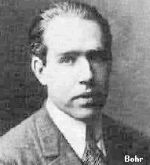Readings on: The universe according to Bohr
Matson, Floyd W. The Broken Image, George Braziler, New York 1964 [abridged — 650 words] — the effects of quantum physics
Barnett, Lincoln The Universe and Dr. Einstein, The New American Library New York 1950 [abridged— 360 words below] — byproducts of quantum physics
Quantum physics demolishes two pillars of the old science, causality and determination. For by dealing in terms of statistics and probabilities it abandons all idea that nature exhibits an inexorable sequence of cause and effect. And by its admission of margins of uncertainty it yields up the ancient hope that science, given the present state and velocity of every material body in the universe, can forecast the history of the universe for all time.
One byproduct of this surrender is a new argument for the existence of free will. For if physical events are indeterminate and the future is unpredictable, then perhaps the unknown quantity called “mind” may yet guide man’s destiny among the infinite uncertainties of a capricious universe. But this notion invades a realm of thought with which the physicist is not concerned.
Another conclusion of greater scientific importance is that in the evolution of quantum physics the barrier between man, peering dimly through the clouded windows of his senses, and whatever objective reality may exist has been rendered almost impassable. For whenever he attempts to penetrate and spy on the “real” objective world, he changes and distorts its workings by the very process of his observations. And when he tries to divorce this “real” world from his sense perceptions he is left with nothing but a mathematical schemes. He is indeed somewhat in the position of a blind man trying to discern the shape and texture of a snowflake. As soon as it touches his fingers or his tongue it dissolves. A wave electron, a photon, a wave of probability, cannot be visualized; they are simply symbols useful in expressing the mathematical relationship of the microcosm.
To the question, why does modern physics employ such esoteric methods of description, the physicist answers: because the equations of quantum physics define more accurately than any mechanical model the fundamental phenomena beyond the range of vision. In short, they work. In the abstract language of mathematics he [the scientist] can describe how things behave though he does not know—or need to know—what they are.


